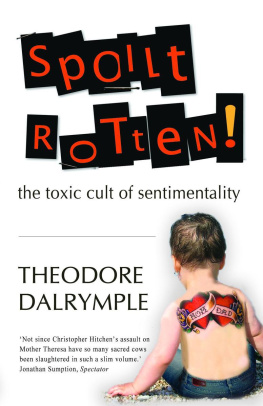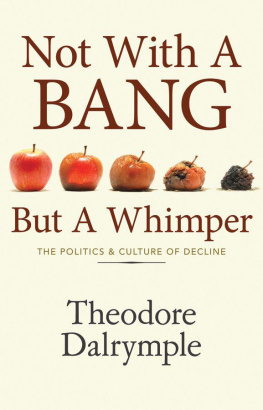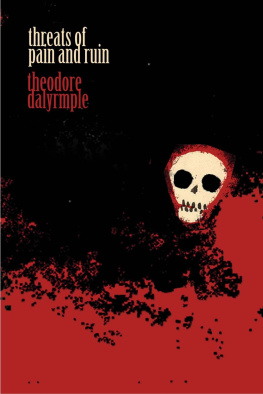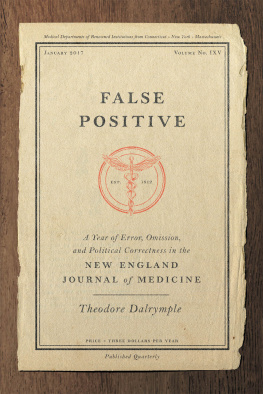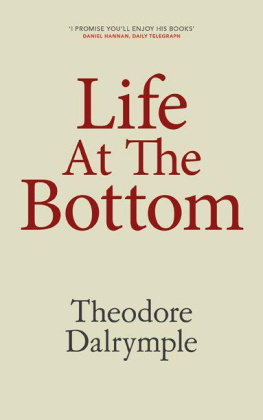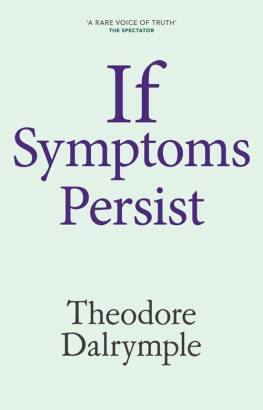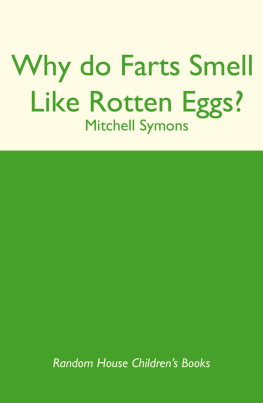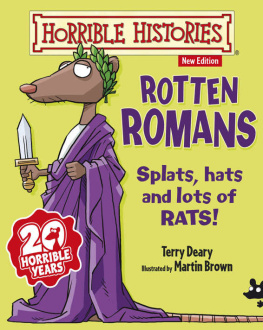Theodore Dalrymple - Spoilt Rotten: The toxic cult of sentimentality
Here you can read online Theodore Dalrymple - Spoilt Rotten: The toxic cult of sentimentality full text of the book (entire story) in english for free. Download pdf and epub, get meaning, cover and reviews about this ebook. year: 2011, publisher: Gibson Square Books Ltd, genre: Art. Description of the work, (preface) as well as reviews are available. Best literature library LitArk.com created for fans of good reading and offers a wide selection of genres:
Romance novel
Science fiction
Adventure
Detective
Science
History
Home and family
Prose
Art
Politics
Computer
Non-fiction
Religion
Business
Children
Humor
Choose a favorite category and find really read worthwhile books. Enjoy immersion in the world of imagination, feel the emotions of the characters or learn something new for yourself, make an fascinating discovery.
- Book:Spoilt Rotten: The toxic cult of sentimentality
- Author:
- Publisher:Gibson Square Books Ltd
- Genre:
- Year:2011
- Rating:4 / 5
- Favourites:Add to favourites
- Your mark:
- 80
- 1
- 2
- 3
- 4
- 5
Spoilt Rotten: The toxic cult of sentimentality: summary, description and annotation
We offer to read an annotation, description, summary or preface (depends on what the author of the book "Spoilt Rotten: The toxic cult of sentimentality" wrote himself). If you haven't found the necessary information about the book — write in the comments, we will try to find it.
Spoilt Rotten: The toxic cult of sentimentality — read online for free the complete book (whole text) full work
Below is the text of the book, divided by pages. System saving the place of the last page read, allows you to conveniently read the book "Spoilt Rotten: The toxic cult of sentimentality" online for free, without having to search again every time where you left off. Put a bookmark, and you can go to the page where you finished reading at any time.
Font size:
Interval:
Bookmark:
Crying out to be written.
Sunday Telegraph
[A] cultural highlight.
Observer
Surgical demolition.
Guardian
Witty, always punchy and sometimes rapier-like.
Tom Adair, Scotsman
Not since Christopher Hitchens assault on Mother Theresa have so many sacred cows been slaughtered in such a slim volume.
Jonathan Sumption, Spectator
One of our most celebrated essayists.
Toby Young, Mail on Sunday
Excellent
Sunday Express
Crying out to be written.
Sunday Telegraph
Entertaining really good stories.
Express
Inimitable.
Specator.co.uk
In this perceptive and witty book, Theodore Dalrymple unmasks the hidden sentimentality that is suffocating public life. Under the multiple guises of raising children well, caring for the underprivileged, assisting the less able and doing good generally, we are achieving quite the opposite for the single purpose of feeling good about ourselves. Dalrymple takes the reader on both an entertaining and at times shocking journey through social, political, popular and literary issues as diverse as child tantrums, aggression, educational reform, honour killings, Che Guevara, Eric Segal, Romeo and Juliet, the McCanns, public emotions and the role of suffering, and shows the perverse results when we abandon logic in favour of the cult of feeling .
Theodore Dalrymple writes for the Wall Street Journal, Times, DailyTelegraph. For over ten years, he had a column in the Spectator on his work as a prison doctor and psychiatrist. His previous books include The Pleasure of Thinking and Litter. He currently writes expert psychiatric assessments in murder trials .
The Toxic Cult of Sentimentality
THEODORE DALRYMPLE

Only a man with a heart of stone could read of the death of Little Nell without laughing.
Oscar Wilde
Ill thcream and thcream and thcream until Im thick I can you know.
Violet Elizabeth, in Just William by Richmal Crompton
Introduction
A recent report by the United Nations Childrens and Educational Fund (UNICEF) stated that Britain was the worst country of twenty-one advanced countries in which to be a child. Normally I do not set much store by these kind of league-table statements, which are usually based upon many false premises, suppositions and the like, and are designed to produce the very results that will confirm their authors prejudices (or their authors employers prejudices). Rarely do such reports fail to suggest that more government intervention in peoples lives is the answer to the problems with which they deal.
But the UNICEF report is right, grosso modo. If there is a country in the developed world in which childhood is a more wretched experience than in Britain, I do not know it. It is wretched not only for those experiencing it themselves, but for those experiencing British children. The British are a nation that fears its own children.
I see this at the bus stop in the little town in Britain in which I live some of the year. By prevailing standards, the children of this town are by no means bad, but their mere presence in any numbers makes old people at the bus-stop shrivel into themselves, and huddle up together for protection, as the Voortrekkers in South Africa used to form a circle of their wagons at night when travelling through potentially hostile territory. If a child misbehaves dropping litter, spitting, swearing loudly, bullying another child, pulling hair, drinking alcohol the old people notice, but say nothing. Tempers these days are short, knives are often long, and children quickly band together to defend their inalienable right to utter egotism.
In Britain, violence committed by and on children has increased very rapidly. The emergency departments of out hospitals report a dramatic rise in such cases, fifty per cent in five years, involving tens of thousands of cases. Teachers are increasingly subjected to threats from their pupils. In the year 2005-6, for example, 87,610 children, that is to say 2.7 per cent of all children at secondary school, were excluded for a time because of verbal or physical attacks on teacher (in Manchester, 5.3 per cent of secondary pupils were so excluded, and it is an unfortunate fact that where metropolitan areas lead, other areas usually follow).
A recent survey showed that a third of British teachers had suffered physical attacks from children, and a tenth of them had been injured by children. Nearly two thirds had been had been verbally abused and insulted by children. A half of them had thought of leaving the teaching profession because of the unruly behaviour of children, and as many knew of colleagues who had done so.
As if this were not bad enough, five-eighths as many teachers have faced aggression from parents as from the pupils themselves. That is to say, teachers cannot rely on parents to back them up in trying to deal with an unruly, aggressive or violent child, quite the contrary. (This is exactly what my patients who were teachers told me.)
The complacent suggest that twas ever thus, and in a sense they are right. There is no kind of human behaviour that is utterly without precedent: the world is too old for people to invent wholly new ways of behaving. For every act of viciousness, malignity or brutality, there is always an historical precedent. Nevertheless, it is within living memory that in most cases when a child misbehaved in school, and his parents were informed of it by a teacher, the child could expect retribution at home as well as discipline at school. Now, in a large number of cases, he can expect neither. The question is not whether each individual case is without precedent clearly it is not but whether the number of cases has increased, and whether there is any reason, other than a decline in the numbers of children, that it should decrease.
It is not only teachers who suffer from the aggression and violence of parents. An article published in 2000 in the Archives of Diseases of Childhood found that nine out of ten trainees in paediatric medicine in Britain had witnessed a violent incident involving a child, nearly half of them within the last year, four out of ten had been threatened by a parent, five per cent had actually been assaulted, and ten per cent had been the object of an attempted assault.
It is important to understand that these figures are quite enough to produce a permanent atmosphere of intimidation, and that this atmosphere of intimidation pervades everything. A single incident has a powerful demonstration effect. Here I will give two examples, drawn from slightly different spheres, of how behaviour is changed by such an atmosphere.
I once had a patient who claimed that he had not worked for a long time because he had a back injury. He received a certificate of ill-health and exemption from work from his general practitioner. Despite his back injury that allegedly prevented him from working, his main interests were judo and jogging, which he did every night without fail. I noticed that in the hospital he got on and off his bed without the slightest difficulty or suggestion of back pain. In short, he was an exceptionally fit and athletic young man.
I telephoned his general practitioner to inform him of my finding, suggesting that his alleged back injury could not justify a certificate of ill-health.
Font size:
Interval:
Bookmark:
Similar books «Spoilt Rotten: The toxic cult of sentimentality»
Look at similar books to Spoilt Rotten: The toxic cult of sentimentality. We have selected literature similar in name and meaning in the hope of providing readers with more options to find new, interesting, not yet read works.
Discussion, reviews of the book Spoilt Rotten: The toxic cult of sentimentality and just readers' own opinions. Leave your comments, write what you think about the work, its meaning or the main characters. Specify what exactly you liked and what you didn't like, and why you think so.

